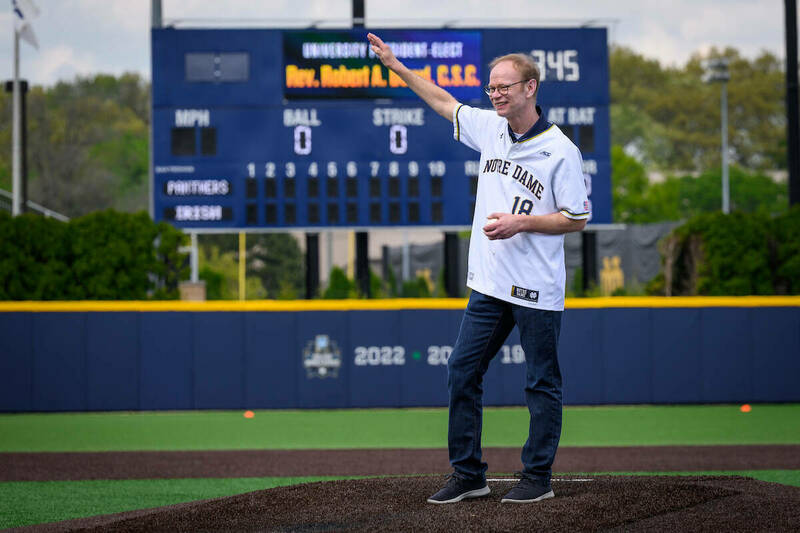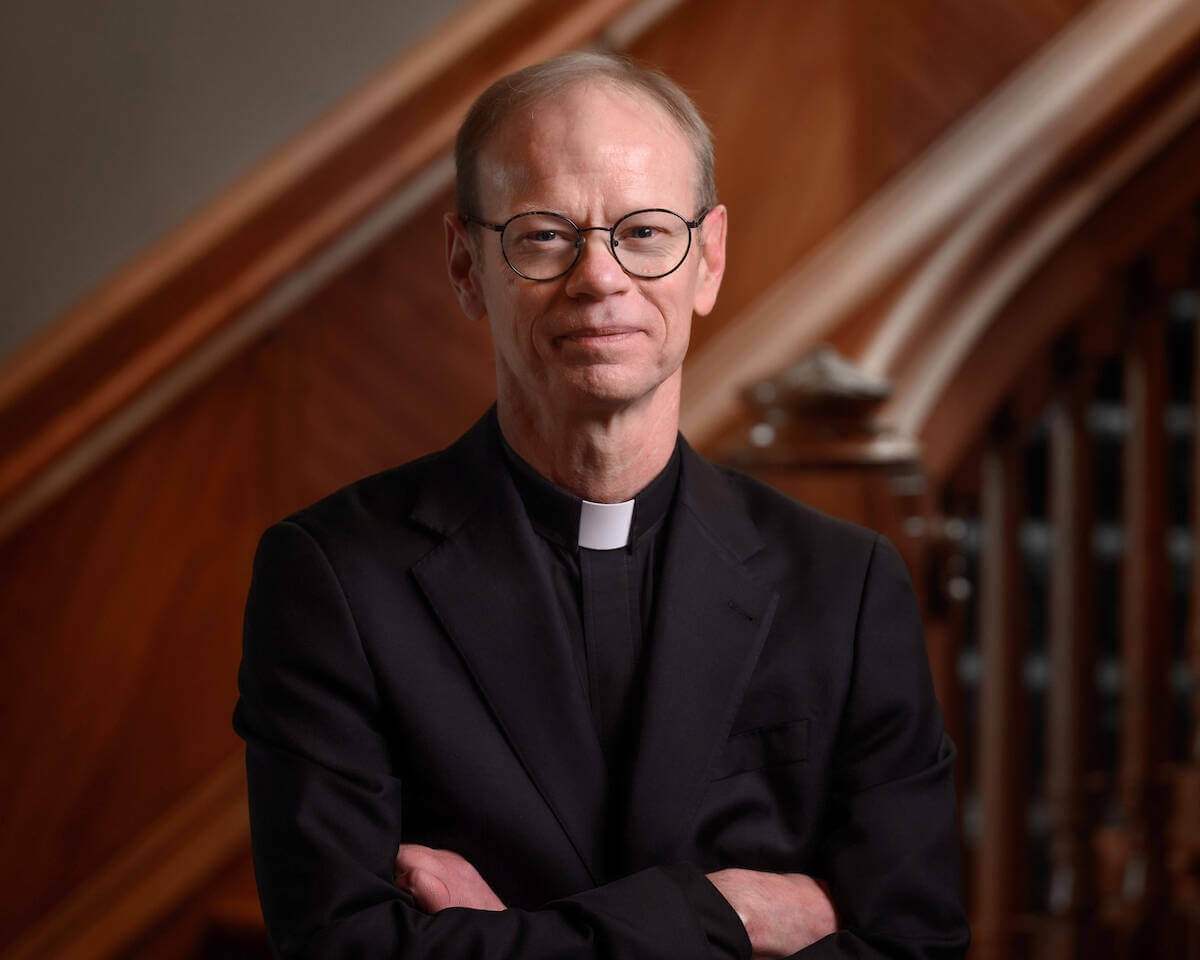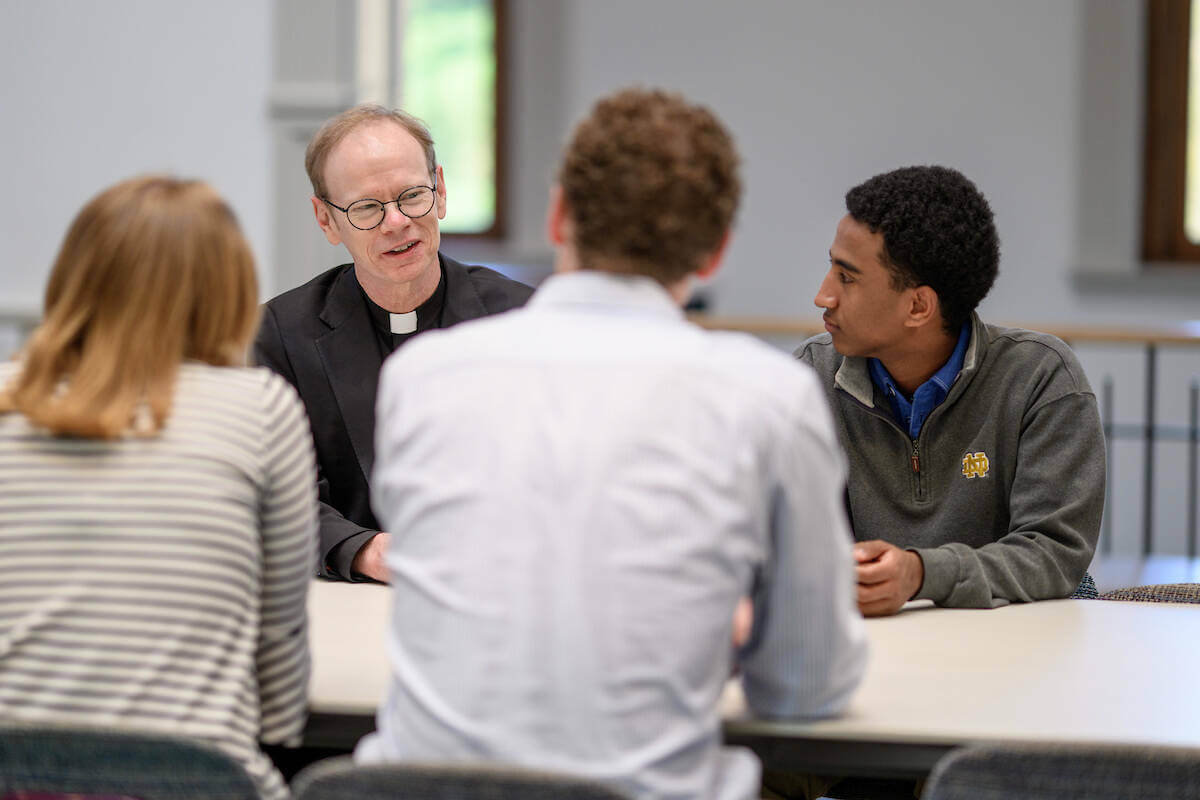 Dowd prepares to throw out the ceremonial first pitch at a Fighting Irish baseball game. Photography by Matt Cashore ’94
Dowd prepares to throw out the ceremonial first pitch at a Fighting Irish baseball game. Photography by Matt Cashore ’94
There may have been early hints that Robert Dowd was destined for a life as a priest and as president of the University of Notre Dame.
While growing up in Michigan City, Indiana, Dowd’s younger sister, Mary Wiegand, says she sometimes waited to walk home with her big brother after school at Queen of All Saints parish. When he didn’t appear, he usually was in a classroom visiting with the two Holy Cross sisters who team-taught his first-grade class.
And from age 7 or 8, young Bob Dowd would play priest by reenacting the Mass in the family living room, recalls his mother, Norma Dowd Krentz. “He would give his homily. And if we didn’t pay attention, he’d get upset,” she recalls with a smile.
Patrick Bobillo, a friend of Dowd’s since they were in first grade, recalls his childhood playmate also performing the Mass in his backyard for the neighborhood children. “He’d use Necco Wafers as the host and do the entire Mass as well as he could using a missal someone had brought home,” he says.
Father Robert A. Dowd, CSC, ’87, became Notre Dame’s 18th president on June 1, succeeding Father John I. Jenkins, CSC, ’76, ’78M.A., who served for 19 years.
With a calm and unassuming demeanor, Dowd, 59, is settling into the job.
The new president says he’s been impressed with the spirit of teamwork across the University that he experienced in the months leading up the start of his presidency. “Moving forward, I’d like to make teamwork a way of life at Notre Dame,” he says.
Dowd lists goals that are in line with the University’s Strategic Framework: increased interdisciplinary research; making Notre Dame more accessible and affordable; becoming the leading global Catholic research university; and increasing the diversity of the student body to more accurately mirror the global Catholic community.
At one time some thought Notre Dame’s growing research capacity might harm its reputation for undergraduate education, but research has instead enhanced that reputation, Dowd says. “Our students are getting instruction from professors who are at the top of their game. We want to make sure that the professors who are doing pathbreaking research are in the classroom.”
A Holy Cross priest since 1994, Dowd most recently served as a University vice president and associate provost. He’s a professor of political science and also has served as religious superior of the Holy Cross community on campus.
Dowd was born in Louisville, Kentucky. Mary, his only sibling, was born 11 months later.
By the time he was 2, his family had moved to Michigan City, Indiana, on the south shore of Lake Michigan. Queen of All Saints became their parish. Dowd says his family wasn’t overly pious, but the Church was important in their lives.
Growing up just 45 minutes from Notre Dame, Dowd has memories from early childhood of visiting campus with his parents and sister and attending football games. His father, Robert A. Dowd Sr. ’56, passed along his love of the University to his son. (The elder Dowd died in 2004.) “I kind of grew up with Notre Dame on my brain,” Dowd says.
He attended Marquette Catholic High School in Michigan City, graduating in a small, close-knit class, and he was an athlete, playing third base and catcher on the varsity baseball team and goalkeeper on the soccer team and participating in the hockey club.
Writing for the high school newspaper, he considered a career in journalism. He also performed in a school musical as one of the Jets gang members in West Side Story and sang in a boys’ vocal group, the Not Ready for Marquette Singers.
Dowd was an altar boy during grade school. Although altar servers typically end their service in eighth grade, Sister M. Macrina Wrobel, CSC, was adamant that she wanted Dowd and three of his classmates back during high school to serve at Christmas midnight Mass. They obliged. She called them her “Altar Boy All Stars.” “I think she probably had a hunch that one of us was going to go into the priesthood,” Bobillo says.
Dowd has kept in close touch with childhood friends, regularly attending reunions and weddings. In 1998, he concelebrated Bobillo’s wedding. “That meant a lot to me. I was really pleased that my old friend who had celebrated Mass as a boy in his backyard was able to marry us,” Bobillo says.
A lifelong baseball fan, Dowd cheered for both Chicago teams and also followed the Cincinnati Reds. He was an excellent player, Bobillo says. During high school, their friends sometimes called Dowd “Sparky” in homage to Sparky Anderson, manager of the powerhouse Reds in the 1970s.
Bobillo wasn’t surprised when he heard Dowd would become Notre Dame’s president. “It’s not a surprise at all because he was always compassionate and a great listener,” he says. “It couldn’t happen to a nicer man.”

After high school, Dowd enrolled at Saint Meinrad College, a small Catholic institution in southern Indiana. He was in the undergraduate seminary program and affiliated with his home diocese of Gary, Indiana.
Dowd transferred to Notre Dame as a sophomore and lived in Grace Hall, then a men’s residence hall. One of his favorite campus spots as a student was the Oak Room, the public cafeteria that then existed in South Dining Hall. He liked the atmosphere and the cafeteria offered free refills of coffee, he explains.
Outside the classroom, Dowd participated in intrahall sports and volunteered at the Northern Indiana State Developmental Center, a facility near campus that served developmentally disabled children. He worked a part-time job in North Dining Hall and, later, at his hangout in the Oak Room.
Thoughts of the priesthood remained on Dowd’s mind throughout his undergraduate years as he worked toward his bachelor’s degree in psychology and economics. He knew many Holy Cross priests and brothers and was drawn to the congregation’s focus on education.
Three months after graduating, Dowd entered Moreau Seminary. After beginning his theological studies at the Jesuit School of Theology at Berkeley in 1989, he asked to spend 18 months with the Holy Cross community in East Africa. He wanted to move beyond his comfort zone and experience more of the world.
Soon he was off to Kenya. He lived with African Holy Cross seminarians and brothers in Dandora, a large slum neighborhood of the capital, Nairobi, where the congregation ran a parish. He worked in the parish, teaching catechism and directing a program that paid school fees for children from the area’s poorest families. The work allowed him to visit hundreds of families in their homes.
Africa was challenging and immensely rewarding, a transformative experience, he says. “I came face to face with people who refused to let material poverty rob them of their humanity.” He grew more aware of the international mission of Holy Cross and the Church while learning about social and political changes then occurring in Africa.
When he arrived, Kenya had a single-party government by law, and many Kenyans were agitating for change. The government resorted to repression and violence. Dandora was a hotbed of opposition activity, and Dowd witnessed clashes between paramilitary police and protesters.
By the time he left, the nation had changed its constitution to allow for full democracy and multiparty elections. “I became really interested in Kenya’s political transition, but also in . . . the role that religious institutions might play after the breakdown of the old single-party state,” he says.

Back at Berkeley, Dowd completed his Master of Divinity degree in 1993. After being ordained a year later, he worked in Campus Ministry, served as associate rector of the Basilica of the Sacred Heart and as an assistant rector in Flanner Hall.
He attended graduate school at UCLA, earning a master’s degree in African studies and a doctorate in political science, then joined the Notre Dame faculty in 2004. Specializing in comparative politics, his research focuses on how Christian and Islamic religious communities affect support for democratic institutions, especially in Africa, and in 2015 he published Christianity, Islam, and Liberal Democracy: Lessons from Sub-Saharan Africa.
Dowd has traveled to Africa more than 15 times for research and Holy Cross work, including the effort to establish the Brother Andre Hospital in Nairobi. He’s visited at least eight African countries.
At Notre Dame he founded the Ford Program in Human Development and Solidarity. Dowd “is a man who truly cares for the poor. He has a pastoral heart,” says Monsignor Lloyd Torgerson, pastor of St. Monica Catholic Community in Santa Monica, California, a mentor and friend who has known Dowd for nearly 30 years.
In the classroom, Dowd teaches students to reject overly simplistic notions of how religion and politics are related. He encourages them to think critically and to cultivate the conditions that help make religion a constructive and peaceful force.
His religious vows and priesthood are central to his identity. “Among other things, I see my role as a priest as one who helps people to believe that there is more to life than what meets the eye and that God is with them,” he says. Priests are called to build bridges that help people to connect with God and each other, he adds.
He is intent on his goals for Notre Dame.
In the wake of last year’s United States Supreme Court decision banning affirmative action, Notre Dame’s ongoing effort to increase student diversity will require intensive work to build its relationships with high schools with diverse student populations, especially Catholic high schools, he says. “We want to make sure that students from various backgrounds see Notre Dame as a place where they can thrive. And of course, that depends on students actually thriving once they get here and feeling at home,” Dowd says. The goal includes an increasingly diverse faculty and staff, too.
The best ambassadors for attracting students among historically underrepresented minorities — particularly Catholic students of different ethnic and racial backgrounds — are current students and alumni, he says.
The priest wants to expand Notre Dame’s involvement in South Bend and the surrounding region. He’d like to see University-based research help address community challenges, but he doesn’t like references to the area being a “laboratory” for academics. “We want to partner. Our guiding principles are in Catholic social teaching. It means engaging in the community in the most respectful, thoughtful, collaborative way possible,” he says.
Dowd has been a Notre Dame football fan since childhood, attending all games when he’s on campus. He’s closely following the myriad changes in college athletics. “That’s becoming a wild and ever-shifting landscape,” he says.
“I want to make it perfectly clear that we’re going to do our best to maintain integrity,” he says. Notre Dame is foremost an academic institution, but at the same time aims to compete at the highest level on the athletic field. “And I really think to do both is the Notre Dame way.”
“Ultimately, finally, we want to do what’s best for our student-athletes and what’s best for the University,” Dowd says.
Dowd lives in Cavanaugh Hall, a women’s dorm, where he has been priest-in-residence for more than a decade. As president he plans to continue living there in his second-floor apartment overlooking North Quad.
The priest is a welcoming presence to the women of Cavanaugh — kind and hospitable, always offering a hello and often stopping to chat. During the academic year, he has celebrated Mass in the hall’s Chapel of the Holy Spirit on Sunday, Monday and Wednesday evenings and plans to continue doing so whenever he can. After the Monday Masses, hall residents gather for a social hour, dubbed “Smoothies with Father Bob,” either in his small apartment or in the hall’s basement. They talk about anything under the sun. The topic might be classes, the most recent Fighting Irish football game or personal challenges.
Students feel comfortable talking to him, says former Cavanaugh resident Sarah Ochocki ’24. “There are never any qualms about approaching him. There’s never a level of awkwardness.”
“He’s very focused on the individual. He’s very present with you in the moment,” agrees former Cavanaugh resident Audrey Feldman ’24. When Feldman made the decision as a sophomore to convert to Catholicism, Dowd was the first person she told. “I can’t think of anyone who would do a better job as Notre Dame’s president,” she says.
Hall residents appreciate Dowd’s humility and calm demeanor, says Madelyn Alford, a rising junior who first met the priest during freshman welcome weekend. When Cavanaugh residents got the news that Dowd would become Notre Dame’s 18th president, they threw a celebration in his honor, complete with signs and confetti poppers. “It was a lot of fun. He was smiling the entire time,” she recalls.
Amid his new duties after being named president-elect, Dowd found time to show up on the sidelines and bless the team when Cavanaugh progressed to the championship game of the campus flag football competition. (The Cavanaugh Chaos fell 19-16 to the Ryan Hall Wildcats.)
Although Dowd’s schedule has become busier in recent months, his steady nature and focus on the individual hasn’t changed. “He’s just Father Bob to us,” Alford says.
In his spare time, Dowd enjoys bike riding and reading. David Brooks is his favorite contemporary writer; the Confessions of St. Augustine is his top pick among the classics. He spends time with his mother, sister and brother-in-law, who live in South Bend, and his two grown nephews, Ryan Wiegand ’16 and Eric Wiegand, when they visit town.
Dowd still loves baseball and makes it to games in Chicago and to see the South Bend Cubs when he can. Until recently, he was chaplain for the Notre Dame baseball team. His musical tastes are eclectic, spanning pop, classical, country and jazz.
Dowd “has a steady way about him” and will do well as president, says Father Willliam Lies, CSC, ’93M.Div., the provincial superior of the Congregation of Holy Cross. The two men entered the seminary on the same day and were ordained in the same class. “He is patient when he needs to be, and he’s certainly demanding when he needs to be,” Lies adds. “He has a strong moral compass. He’ll do the right thing. It won’t always be the popular thing.”
The new president also takes the time to nurture relationships with others outside his family and campus community who have been important throughout his life.
That includes Sisters Carmel Marie Sallows, CSC, and Alice Clare Hosty, CSC — the nuns who were his first-grade teachers more than 50 years ago. The two longtime schoolteachers, both 91, are now retired and live in the convent at Saint Mary’s College.
Dowd has long made a practice of visiting the religious sisters at Saint Mary’s, joining them for meals. He’s often driven over to pick up Sallows and take her to visit his relatives. Since her former pupil has become the University’s president, “I might have lost my chauffeur,” she jokes.
“He was a very happy, well-balanced child. I never realized he’d grow up to be a priest, let alone president of Notre Dame,” Hosty says. “I think he’s perfect for the job.”
Margaret Fosmoe is an associate editor of this magazine. Contact her at mfosmoe@nd.edu or @mfosmoe.